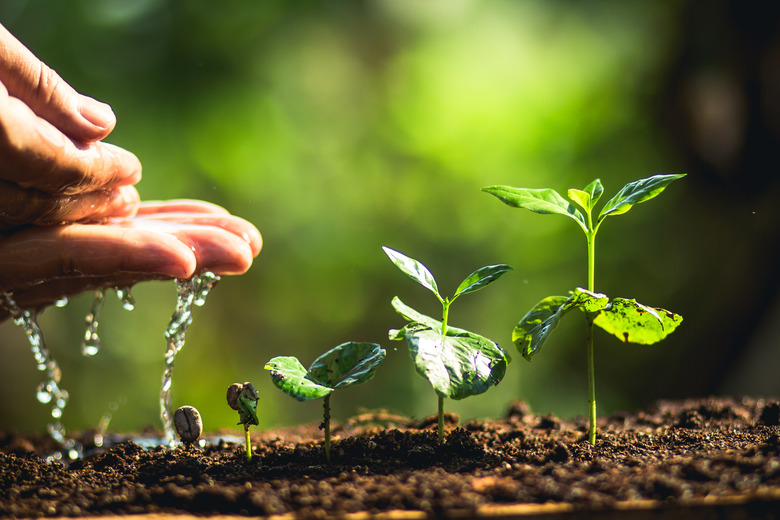What Are Three Things Plants Need To Live?
Plants, like other organic matter, require certain substances in order to grow. Understanding a plant's essential needs helps in growing healthy, strong plants. The three basic requirements for plant growth are water, light and nutrients. While these things are important to plant development, they should be given in moderation. Too much of any one substance can damage or even kill a plant.
Irrigation Is Essential
Irrigation Is Essential
Water is one of the things plants need to live. Plant tissues comprise 80 to 95 percent water. Much of the water for plants comes from absorption of water within the soil. The moisture level of a soil directly affects the survival of a plant; should the soil become too dry, many plants will begin to dry up, wilt and even die off. Even in areas with limited moisture, such as deserts, plants still need water and have adapted ways to make the water received last as long as possible. Too much water, however, can be detrimental for plants. Allowing soil to dry out some between watering prevents damage to the plant caused by over watering.
Plants Need Sunlight
Plants Need Sunlight
Light is another of the basic necessities of life for a plant. Plants need light as part of the process of photosynthesis. Outdoors, and in the case of indoor plants close to windows, sunlight provides the light. In some instances, more light is needed for indoor plants. Many growers supplement sunlight by using artificial fluorescent lighting for plants. Whatever the light source, the results rarely differ. The plant absorbs the light given and collect this light in the chloroplasts of the leaves. This light energy then combines with water and carbon dioxide to produce food for the plant. The color of light matters to plants; plants need light from the red and blue spectrums as opposed to the yellow and green spectrums, according to University of Missouri Extension specialist David Trinklein.
Nutrients Feed Plants
Nutrients Feed Plants
Name three things a plant needs roots for. You might just say nutrients, nutrients and nutrients. Just as humans and other animals need vitamins and nutrients to grow, plants require nutrients for survival. The amount and type of nutrients needed vary according to plant species, though several overarching themes exist. Most plants need some exposure to nitrogen, potassium and phosphorus within the soil. Plants use nitrogen to grow upward, while phosphorus helps with root growth. Plants need potassium for the development of vascular systems to spread nutrients and water around the plant.
Other Things Plants Need to Live
Other Things Plants Need to Live
While water, light and nutrients are essential to plant growth, plants also need other things in order to live. Air proves an essential part of plant growth and survival. Air provides plants with carbon dioxide. Like water and light, plants use carbon dioxide during photosynthesis. Plants need air within the soil, as well. Oxygen in the soil helps the roots of a plant grow and thrive. Most plants need loose, well-aerated soil for root health. The temperature of the air also matters to plants. Some prefer growing in cooler areas, while others need warm air instead. Outdoor plants may need protection from too much sun exposure if they prefer less sunlight. Plants may also need protection from the elements, such as too much wind or hail.
Cite This Article
MLA
Gailliard, Ticara. "What Are Three Things Plants Need To Live?" sciencing.com, https://www.sciencing.com/what-are-three-things-plants-need-to-live-13428190/. 17 September 2018.
APA
Gailliard, Ticara. (2018, September 17). What Are Three Things Plants Need To Live?. sciencing.com. Retrieved from https://www.sciencing.com/what-are-three-things-plants-need-to-live-13428190/
Chicago
Gailliard, Ticara. What Are Three Things Plants Need To Live? last modified March 24, 2022. https://www.sciencing.com/what-are-three-things-plants-need-to-live-13428190/
